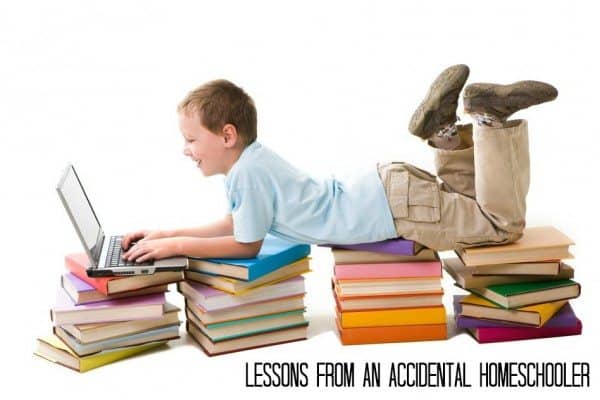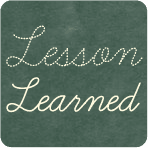
Lessons From An Accidental Homeschooler
 I went to public school. It was fine. I mean, sure, I had my share of problems and the occasional bully, and middle school was no picnic (though I don’t know that it is for anyone, really), but I look back and view it as a decent way to get an education. I learned a lot. I was accepted to college and later, grad school, so clearly something there worked out okay.
I went to public school. It was fine. I mean, sure, I had my share of problems and the occasional bully, and middle school was no picnic (though I don’t know that it is for anyone, really), but I look back and view it as a decent way to get an education. I learned a lot. I was accepted to college and later, grad school, so clearly something there worked out okay.
It’s not that I ever knocked private school or homeschooling, it’s just that I knew they weren’t for me. Public school works! And it would work for my children just as it had for me. It would work better, even, because I volunteered and got involved with the PTA and such. My firstborn—my daughter—loved school and excelled and her teachers were always eager to tell me how much they enjoyed having her in class. She was a handful at home, but not at school. Curious. (Teachers were quick to tell me that was preferable to the other way ’round.) My youngest—my son—was nothing but sunshine at home, but started having trouble at school almost immediately.
He was easily overwhelmed. Too much noise sent him looking for a place to hide. Various activities could send him into a tailspin if they didn’t go exactly the way he wanted them to; if random pieces of colored paper were being handed out and he wasn’t given a green one, for example, he’d have a full-blown tantrum. He seemed completely unaware of other people’s personal space, climbing over classmates at will or plunking himself in a teacher’s lap without asking, but would flip out if another kid brushed up against him when he wasn’t expecting it. If the books were supposed to be lined up a particular way, then by God they needed to be lined up that way and only that way or the sky might fall. “Do it all over again!” became his battle cry, and though we joked about it, it was clear that something was going on. So we had him tested. It turned out that he had Sensory Integration Disorder, and in our original school district this was something of a golden ticket to services: He was placed on a 504 Plan where he received regular Occupational Therapy to help him cope with his sensory issues, plus he received other accommodations like a pass to go to his “quiet space” whether he was too overwhelmed. Public school was pretty accommodating of his needs, and we breathed a sigh of relief that everything had gone so well.
A couple of years later, we moved, and we brought his 504 Plan to the new district and they assured us they could support my son in the public schools. And they did… sort of… but he continued to struggle, and within a couple of more years, we were having him evaluated again. This time, we were told he’s actually autistic (Asperger’s Syndrome, or High-Functioning Autism). More accommodations were needed, so his 504 was converted to a full IEP, and the school insisted they could do everything he needed. Sure, maybe they insisted that after we brought an advocate with us to a few meetings, but no matter! Public schools work and he had an IEP and even a one-on-one aide (which is very rare in our district) for his last year of elementary school. We were making it work… kind of.
And then we went to middle school orientation and it was pure chaos. It was loud and crowded and crazy. My son—11 years old by this time, but the size of a child much younger, and with the social grace of your average kindergartener—ended up curled up underneath a desk, asking if we could please go home. We had known that this might happen; that was just the moment when we knew we had to stop trying to stuff our square peg into a round hole.
We left, and I submitted our Intent to Homeschool paperwork. I had absolutely no idea what I was doing. I work full-time from home, so I knew I could flex my schedule somewhat, but I was still terrified of what this decision meant for my career, for my son’s education, even for our relationship. It’s been two years, and I’m still learning, but here’s a few of the things I’ve learned through this experience.
What this homeschooling experience has taught me
Nothing is permanent; try something, and if it doesn’t work, try something else. We looked into several homeschooling umbrella programs—I knew there was no way I could do this all on my own—and chose a nearly-full-time local program for his first year. This year we went down to just three days a week in last year’s program, and on his days at home he works on online classes. And as we wrap up this second year… well, we’ve decided not to enroll in an outside program for next year at all. He’ll do online classes from home, and we now have a wide enough circle of fellow homeschoolers around to set up some weekly enrichment activities with his peers. It feels like a natural progression, and if for some reason this isn’t right, we’ll try something else.
Look at what was working and what wasn’t, and plan accordingly. My son was fine in public school when he was academically challenged in a subject he liked, and often had difficulty when he was bored or stressed. Noting this, we moved him ahead in math (his best subject) and a wonderful teacher found what he actually liked to write about to get him writing again (after our state’s writing test all but made him stop writing entirely). He can take breaks when he needs them. Online classes are perfect for my Aspie—accelerated academics without the classroom chaos, and he can work at his own pace. The mixed-age homeschool group allows him to work on his socialization challenges separate from his main school work, which is helpful for him.
Homeschooling is different than you think. I knew homeschooling wasn’t all religious fundamentalists these days, but it wasn’t until we jumped in that we discovered there’s as much variety in homeschooling families as public school families, and variety in available programs, too. Even as a family with one homeschool kid and one public school kid, we turn out to be not that unusual. Different kids need different things. I think we see a higher percentage of special needs kids in homeschooling, but I have been surprised and delighted by the level of tolerance and acceptance this seems to breed. Many of us turned to homeschooling due to poor experiences elsewhere. As tribes go, it’s a pretty inclusive one.
You don’t necessarily have to know the whole plan right now. We walked away from public school with the knowledge that middle school tends to be especially brutal for kids on the autism spectrum (middle schoolers tend to be miserable, anyway, but this is where the gap between neurotypical and non-neurotypical development tends to be most stark). It seemed simple enough to step away for middle school, with the goal of putting him back into the district for high school. An interesting thing has happened in the intervening two years, though; while I now feel like my son probably could handle our local high school, I no longer feel like he necessarily should. We have a year to decide, but I know he’ll be fine either way.
Plans are good, but don’t forget to have fun. Most days when my son is doing school, I’m doing my own work, too. But sometimes it’s a beautiful day and we take a break to work in the garden or go pick berries. This is the huge upside to setting our own schedules, and any time we break from the routine to do something fun, it’s not just an adventure, it’s a reminder to me that my once-inflexible boy can now go with the flow in a way that he never used to. Homeschooling gave him that. Heck, I think homeschooling may have given that to me, too.
More Homeschooling Advice from Alpha Mom:
- Be Flexible- Learning Does Not Have a “Face.”
- Failure is a Possibility. Expect It.
- Building the Framework for Life-Long Learners

